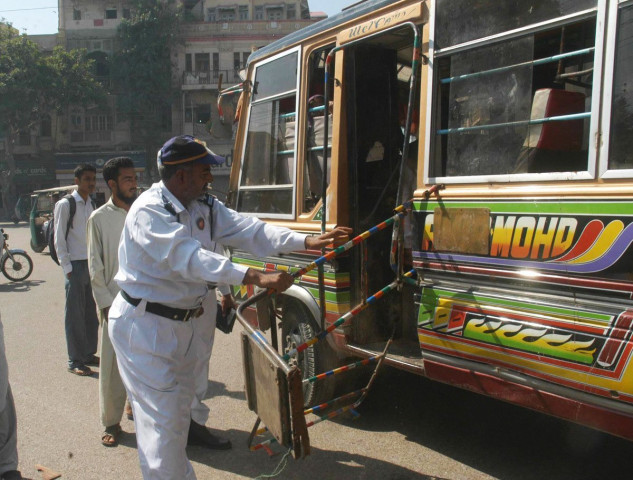Psychological woes: Poor mental health affecting police morale
Psychological training sessions organised for junior officials, wardens.

Training sessions for the mental well-being of traffic wardens conducted. PHOTO: EXPRESS
The sessions were organised in collaboration with the CTO’s and CCPO’s office. Tahir, a Dubai-based psychologist who had volunteered for the sessions, told The Express Tribune that 300 wardens had participated in the first session. He said he had spoken with the wardens in private at first as they were not keen on speaking about their psychological woes in the presence of senior officials. Tahir said the wardens had spoken about issues that had been preventing them from effectively discharging their duties.
He said the second phase had been organised to spread awareness among them regarding correlation between psychological problems and their output. “Stress is the natural result of problems in every profession. A negative approach regarding this can disillusion anyone,” Tahir said. He said mental health problems were widespread among policemen due to the public nature of their vocation. Tahir said this was compounded by the fact that they often had to deal with traumatic situation that could compromise their mental health.
He said he had come to the conclusion that many wardens had lost interest in their jobs due to a myriad of reasons. Tahir said these included long duty hours, rude public behaviour and the lack of a service structure.
Another session was organised later at Qurban Lines. At least 15 SHOs, 15 community police officials, 15 officials from the Mujahid Force and 15 constables participated in the session. The officials said long duty hours, rude conduct of senior officials and the absence of a system to reward performance were to be blamed for poor performance standards and their problematic behaviour with citizens. Tahir said the main reason for their poor performance was rooted in the rude conduct of senior officials towards them. He said junior officials would be unable to perform better until this was remedied. Tahir said there was a pressing need to routinely counsel policemen as the vocation was stressful in nature. He said it was imperative to do this to prevent them from cracking under pressure. Tahir said merely interacting with trauma victims could result in anxiety, agitation, anger and anguish. He said he had informed policemen regarding the need to consciously keep a tab on their mental health problems to promote better cognitive management. Tahir said sessions of the ilk would be more effective if senior police officials were also counselled.
He said many policemen had also bemoaned the absence of regular psychological counselling. Tahir said the police should hire a team of 10 to 15 professional psychologists to help address mental health issues afflicting junior police officials. He said more funds should be allocated on this front. CTO Tayyab Hafeez Cheema said the initiative would improve confidence, integrity and good conduct among the force. He said citizens would feel more secure and start cooperating with police after noting the change in the conduct of policemen.
SMU Senior Member Salman Sufi said the following sessions being organised would include senior police officials. He said they would be made cognisant of the challenges confronting junior officials. Sufi said this would also identify and help remedy psychological problems preventing junior officials from effectively discharging their duties. He said the initiative had been taken as the role of the force had undergone a radical shift. Sufi said the police was now operating as a frontline force against terrorism. He said this had mandated a change in focus from physical to psychological warfare. Sufi said it was imperative in this regard to psychologically train policemen to ensure that they effectively discharged their duties on this front.
Published in The Express Tribune, January 31st, 2015.



















COMMENTS
Comments are moderated and generally will be posted if they are on-topic and not abusive.
For more information, please see our Comments FAQ